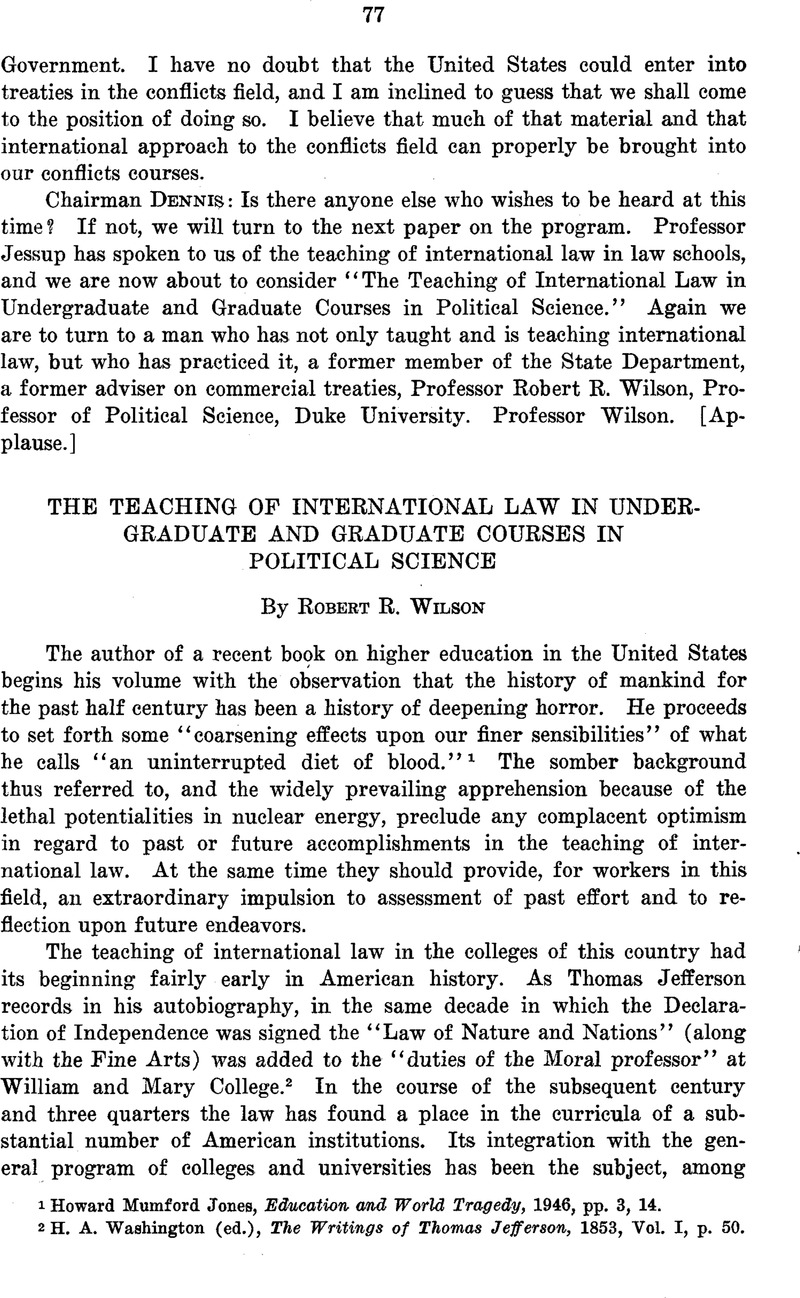No CrossRef data available.
Published online by Cambridge University Press: 27 February 2017

1 Jones, Howard Mumford,Education and World Tragedy, 1946, pp. 3, 14.Google Scholar
2 H. A. Washington (ed.), The Writings o f Thomas Jefferson, 1853, Yol. I, p. 50.
3 Cook, Walter Wheeler , “ Scientific Method and the Law,” The Johns Hopkins Alumni Magazine, X V (1927), p. 213.Google Scholar
4 Remarks of Wright, Quincy, Second Conf. o f Teachers o f Int. Law and Belated Subjects (1925), Proceedings, pp. 50-51.Google Scholar
5 Hudson, Manley O. , “ Contemporary Development o f International Law, ” same,pp. 83, 85.Google Scholar
6 Hudson, Manley O. ,Fourth Conf. o f Teachers o f Int. Law and Belated Subjects (1929), Proceedings, p. 142.Google Scholar
7 Fifth Conf. o f Teachers of Int. Law and Belated Subjects (1933), Proceedings,p. 105.
8 The Outlook for International Law, 1944, pp. 1-18. Kunz, Josef L. Compare ,“ The Problem of the Progressive Development o f International Law, in Iowa Law Review, Vol. 31, p. 546: The States treat international law as law and whatever excuses they may bring forward to justify legally doubtful positions or open violations of international law, they never resort to what would be the best defense, namely to say that the rules of international law do not constitute law, and are, therefore, not legally binding upon them. The arguments of laymen and lawyers against the legal character of international law consists mostly in the lack of organization and sanction.” Google Scholar
9 Fourth Conf. o f Teachers o f Int. Law and Belated Subjects (1929), Proceedings,p. 162.
10 Quoted by Professor Hull, in Fifth Conf. o f Teachers o f Int. Law and Belated Subjects (1933), Proceedings, p. 111.
11 Bailey, Thomas A., A Diplomatic History o f the American, People, 1946 (3rd ed.), p. 869.Google Scholar
12 Corwin, Edward S. , The Constitution, and What It Means Today, 1947 (9th ed.),p. 95.Google Scholar
13 Wright, Quincy , A Study o f War, 1942, Vol. I, Ch. 13.Google Scholar
14 American Society o f Int. Law, 1946, Proceedings, p. 126.
15 See the remarks of Hudson, Manley O. and ofBorchard, Edwin M. in Second Conf.of Teachers o f Int. Law and Belated Subjects (1925), Proceedings, pp. 39, 85.Google Scholar
16 See the remarks of Charles G. Fenwick in same, p. 67.
17 Compare Emery Keves, The Anatomy o f Peace, 1945, Chs.9, 11.
18 See, on the general subject, W. B. Donham, Education fo r Responsible Living,1944, Oh. 19.
19 Compare Soulsby, H. G., The Right o f Search and the Slave Trade in Anglo-American Relations 1814-1860, 1933, in general.Google Scholar
20 Nelson, M. F. , Korea and the Old Orders in Eastern Asia, 1945, Ch. I.Google Scholar